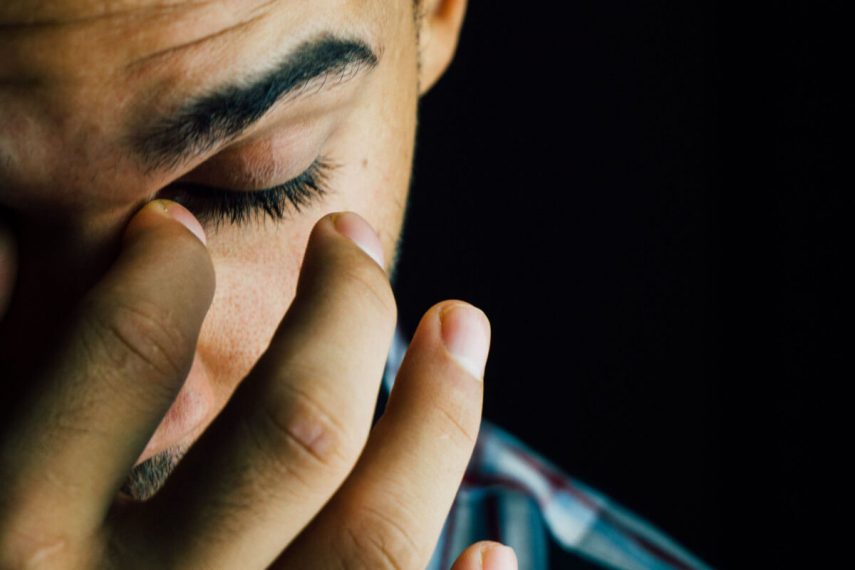When I first read these song lyrics, a chill went through me. You see, I've personally been clinically depressed and so I'm familiar with the feeling of being "on the edge".
Lyrics for "Act of Depression" by UnderOath.
I was surprised how vividly the lyrics captured the sometimes dark and "soul-less" states of depression. Yet I also felt an underlying current of hope because the lyrics acknowledge the possibility of "what might have been" even as they mourn the missed opportunities.
Paradoxically, the lyrics imply that anything is possible, even when all you feel is that nothing is possible. In fact, you could say that what this song's really about is second chances.
And isn't that what release from depression should feel like?
So although this song is pretty dark, it also carries the implicit promise of redemption.
Act of Depression
I tried to cry out from the inside, but I guess my soul did not pour itself out enough
Blood on the walls, flaming black, blood on the walls,
I saw you staring through the cracks
No one was to know what was happening in me I felt no love,
I felt no reason to carry on with my life
Everything was wrong, nothing was right, at least that is what I thought
Kids finding laughter at my expense
They were killing me on the inside they couldn't give up their pride
My heart was bleeding from so much grieving
On the outside I looked fine, you couldn't tell but on the inside was eternal hell
I got caught up in the moment of depression,
and before I knew it my body was lying on the ground
With a gun in my hand my hourglass was out of sand
Thanks to all the people who drove me to death
Without you I could of never ended my breath
Through your anger and hate, I was able to choose my fate
There was a way out, but I chose the easy route
Blast of a gun, breath runs out, final thoughts put to extinction
No more love, no more pain, for you have chosen suicide as the way out... help them
Ice cold fingers, body lays on the floor,
pool of blood you see, you scream out in terror
Her body is now a part of mutilation, her soul the victim of strangulation
I will not accept this evil anymore
I never thought of who I hurt or I never tried to look for the good
I'm sorry for whoever I hurt, it's not easy to look back on my life,
and know I did not know Christ
For now I live in a real hell
I wish I had another chance... then I would live my life with love.
My Personal Musings
What strikes me most about this song is that it illustrates how quickly our states of being actually fluctuate. In a flash we can be plunged into darkness, or raised into the light, often without a clue as to why the change occurred.
The capacity to "turn on a dime" is innate to the nervous system. More importantly, we can actually use this ability to great advantage in the fight against depression.
Yet if you're like me you might not recall too many "fluctuations" in mood during your own depression. What I remember most is a feeling of never-ending "nothingness".
Maybe this rings true for you too...
The anger was gone, only blankness.
An empty pit of "nothingness" as if it would devour me.
I would cease to exist.
Moment after moment I did not exist.
Years later, I finally understand why I experienced depression this way. I've also learned from my clients that this "deep pit of despair" is not uncommon.
I've also learned that it's in the subtle variability of our "states of being" where we find hope for change. We do have some influence over these states, and the seemingly never-ending flatness of feeling can be overcome in the right conditions.
Shades of Grey
What's important to understand is that this "non-feeling" or numbness is a psychophysiological state. At any given time, no matter what we are experiencing, we are in a specific mental/emotional state, but one which can change at any moment.
You see, it isn't completely accurate to say "I'm sad". Sadness comes in many different shades of grey. In fact, given the way the brain functions it's basically impossible to feel the exact same mental/emotional state twice.

In other words, states are like snowflakes - you'll never experience the same one again. That's because every state we experience flows from a different and distinct neural pattern in the brain.
But most people are oblivious to the ongoing changes in their states; this is especially so for those suffering from depression.
Typically, one state glides imperceptibly into another. And, given a multitude of similar states they form together in our mind to create what we feel as a "mood".
As I have described elsewhere on this site, it's almost impossible to deliberately enter a state that's exactly the same as another. Our experience of an event is often made up of many states and the probability is extremely low for having the same neural pattern firing in the brain.
For instance, I can't literally experience the lightness of floating in a swimming pool unless I'm actually doing so; I can only approximate it in my imagination.
Similarly, the experience of nothingness is a state. Problem is, as with all states, when you're having this experience it's hard to imagine anything else.
It feels as if you'll always be this way.
States can be changed.
But even in your darkest moments, if you can find one thing, just one thing that sparks your curiosity or your imagination or touches your heart, then you can change your state. (Recall above that a "state" differs from a "mood".)
This is essentially what happens in the healing process. Our nervous system learns to manage different "states of being". (The process is so subtle and often stretched out over a long period of time that we miss it.)
So this is your task...
Look for those things--even very small things--that give you pause, that make you take a second look. No one can predict what these might be. For me, it might be playing with baby kittens or looking at a sunset. It might be as small as seeing a spider web after a sun shower or reading a poem that rings true.
It's moments like these that help us move from one state to another. Given sufficient "up" states over the course of our healing, they help sustain us - they'll eventually help us from slipping back into the depressive states.
Keep in mind that this attention to your state cannot be a mindless endeavour. You need to bring consciousness to it - as you do when you become present.
And just know that it's unlikely they would be enough--on their own--to move us out of depression. Few people have the stamina and willingness to practice this regularly.
The fastest and most effective way is with a relationship with another human being. That's because it's through connections with others that we'll start to improve--it's how we learn to regulate our states. (And why therapy can be so helpful 🙂
Self-regulation and "getting better"
In infancy the brain grows through the experience of connection with the mother and father. Without that experience a child cannot mature into a self-sufficient, emotionally self-regulating adult.
In the same way, you'll need a connection with another "brain" in order to beat depression. With that emotional connection your brain will learn new ways of being, including healthier and more "feeling" states of being.
This is how therapy works.
Therapy gives you that "brain-to-brain" deep emotional connection. Through a trusting, safe relationship with your therapist, your brain can learn to regulate its states again.
We know this to be true; it's the way we're built. Our brain can learn new things, and it can physically change through experiencing new states.
As your brain repeatedly experiences more resourced states, these "states of being" will gradually become a part of you, a part of your "character". With repeated exposure you can stabilize yourself in a healthy range of states and minimize the chance of backsliding into the "fixed" depressive states.
As hard as it might seem now, you'll need to reach out and connect with someone. Practically speaking, learning to regulate our states through a therapeutic connection is the most efficient way to recover your emotional balance and flexibility.
Therapy offers consistency, the certainty that your therapist will be there for you. Your brain will once again learn to regulate both unpleasant and pleasant states.
It's not easy (especially at the beginning).
I encourage you to begin!
Recovering from depression
If you're dealing with depression, it helps to remember that your progress will not be non-stop, continuous.
Otherwise, you're libel to sabotage yourself believing you're in worse shape than you actually are.
Because, even though you're in recovery, it's normal to still find yourself in a hole from time to time . . . having dips (aka "sh*t happens") - and those dips can feel like the worst day of your life!
As you get over depression
So you thought you were doing fine, and now you can't even get off the couch!
At times like these, you can feel as if you are regressing. Actually "setbacks" like this are a normal part of recovery.
Even when wonderful, joyful things (a.k.a. positive energy infusions) happen in your life--paradoxically--you can once again trip into a state of despair.
Are you relapsing into depression?
You see, old patterns are just that, old neuropathways. They don't just disappear because you are having a positive experience.
The good news is as recovery progresses, new connections in the brain are created.
Remember, the brain is a living organism that adapts to novel experience by "rewiring" memory and procedural circuits. It takes time for new growth to appear and consolidate gains in counseling.
Your recovery from depression has its ups and downs
Recovery means that the tendency to move into states of despair occurs less frequently. That is, the dips show up further apart. Moreover, even if we do fall into a dark state, remarkably, we don't remain there as long.
It is only when you are well into recovery that dips into despair are less likely to happen. There's no guarantee that we never go back. For instance, in the event of sudden or drastic circumstances, old neuropathways can be retriggered.
However, with new regulated pathways the probability is dramatically reduced.
Essentially, the more resourced you are the greater your capacity for managing sudden influxes of energy. The more regulated neuropathways you have--the more joy--and the less likely you are to revisit those dark places.
A new depression treatment strategy
One of my intentions in developing this site is to help you appreciate that new neuropathways are most effectively developed in counseling with the help of an empathetic, attuned therapist.
It's because of this relationship between you and your therapist--one nervous system to another--that the brain learns new ways to manage emotions.
I think most therapists would agree that progress in counseling has its' ups and downs. The development of new neuropathways in therapy is not smooth. It's marked by small, seemingly random peaks of understanding and insight as new neural growth occurs.
As this growth in the nervous system is stabilized and integrated, and new behaviors and ways of being are experienced, the influence of the old pathways fades away.
The Right Brain and Depression
Once you appreciate that depression is primarily an inabiliy of the nervous system to manage energy you'll understand how your recovery will proceed.
Let me explain.
Think of your nervous system as a container. Any stimulation, whether positive or negative, adds to this container. Once you are "full" your nervous system is essentially flooded. It responds to this influx of energy or increase in activation by shutting down sensory inputs. You'll often feel numb as a consequence.
On any given day the ability of your nervous system to process energy will vary. If you stayed home to recuperate one day, you may feel you have enough room in your container to go out of the house the next.
"Can't Get No Satisfaction!"
I emphasize right brain activities a lot on this site because I believe they promote and support your emotional healing. Music, dance, painting--literally any creative activity--can help to calm and integrate the nervous system. As your activation diminishes you'll find yourself better able to experience real satisfaction and pleasure.
And as you bring more of these activities into your life a funny thing happens. They start to work synergistically with other activities.
Let me explain.
A hallmark symptom of depression is the loss of enthusiasm for almost everything. Activities that used to give you pleasure now feel empty and meaningless. Good feelings are no longer savored, they're endured.
Yes, that's what I said, "endured".
Most people suffering from depression will tell you that sitting with a friend is much easier to handle than a group of friends.
You see, when we're depressed even positive sensations if felt for too long are difficult for the nervous system to process. Both positive and negative emotions raise your level of activation.
When the nervous system becomes overly activated (i.e. by too much positive or negative input), it reacts by "turning down the volume". Sensations are muted and emotions downplayed.
Let me give you an example.
In the midst of my depression I might contemplate being on my deck in the afternoon sun as I once did as a child. My mind takes me there quite sporadically yet also intentionally as I attempt to resource myself. As I do so, my internal state changes. I feel warm inside, my nervous system settles down a notch.
However, if I relax into that state too long, basking in the memory of that idylic moment, I run the risk of losing this memory's potential for postive resonance. For even positive sensations can fill your container (positive or negative, energy is energy). Pleasurable moments can eventually be swallowed up by that dull way of being that characterizes depression.
Counseling Tips for Depresssion
Counseling provides an ideal framework for developing neuropathic connections in the brain that you are less likely to develop on your own. That's because a non-judging, caring relationship provides the necessary safety to help the nervous system relax into a positive state.
From time to time, your therapist may draw your attention to aspects of your life that support you. I refer to them as "resources" or self-soothing strategies that create a balance against troubling emotions in a session.
It's important to not gloss over these positive moments too quickly. Use these interventions as opportunities to bring yourself into the present. In other words, as much as you are able, allow your whole body to take it in.
Fortuantely, in the company of an attuned therapist, you have a better chance of going deeper and longer into these states of positive resonance (i.e. as you imagine--during a moment in your counseling session--lying on a beach, swimming like a dolphin, or dancing with a partner).
Advanced Counseling Tip
Many folks are aware that counseling helps us manage uncomfortable emotions. In fact, most people go for just that reason. Yet, few know that this is only the beginning. Counseling offers much more.
Counseling actually provides the necessary conditions for learning how to experience positive emotions. In doing so, it creates tremendous possibilities for expanding our capacity for joyfulness.
Tips to help your recovery
The best strategy is to focus on experiencing little pleasures, a little at a time. By doing this, you will learn to increase your ability to experience bigger pleasures, and for longer periods. This process helps your nervous system "grow" back to health.
Things that in the midst of depression gave you no pleasure will now begin to make you smile.
Try to find and cherish those little comforts in spite of the depression. Approach each task like a smorgasbord--try a variety of small portions rather than a huge serving of just one thing. Later, as your capacity to experience pleasure increases, you'll be able to stay in positive resonanace with each moment for a little longer.
And if you practice this in combination with your counseling, your nervous system will respond. It will literally expand its capacity to take in excitement and your tendency to experience real satisfaction will naturally increase.
Best wishes on your journey!
Related Topics
In "What's the hardest part about being a therapist? I explain how change happens in little moments during the course of your counseling.
Reference
Grigsby, Jim & Stevens, David (2000). Neurodynamics of Personality. New York: Guilford Press. (An awesome book.)



